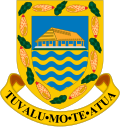| |||||||||||||
All 15 seats in the Parliament of Tuvalu | |||||||||||||
|---|---|---|---|---|---|---|---|---|---|---|---|---|---|
| |||||||||||||
| |||||||||||||
 |
|---|
General elections were held in Tuvalu on 25 July 2002. All candidates were independents, as there were no political parties in the country. Saufatu Sopoanga was appointed prime minister after the election as the previous prime minister Koloa Talake lost his seat. [1]